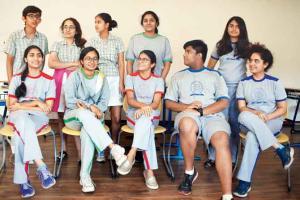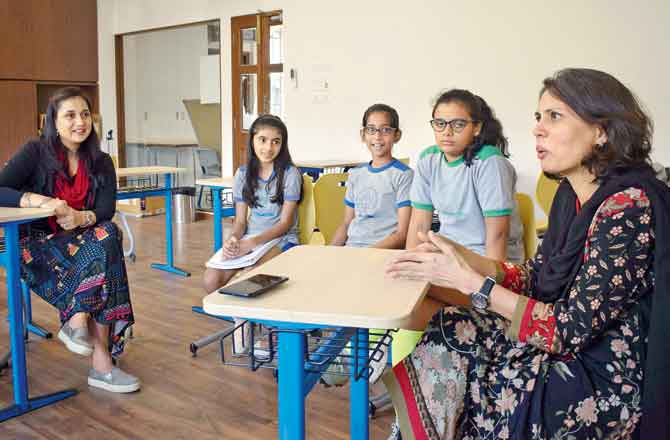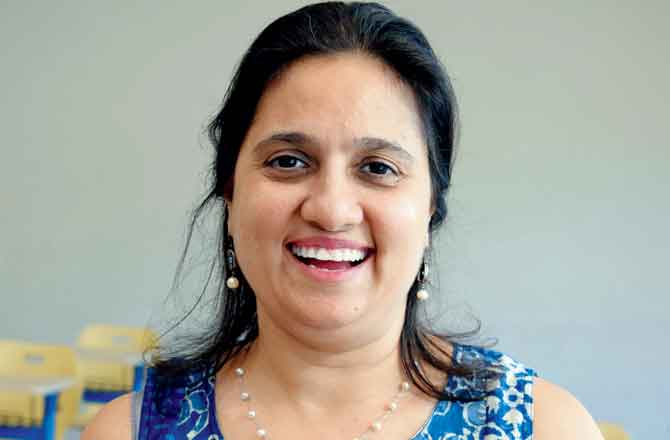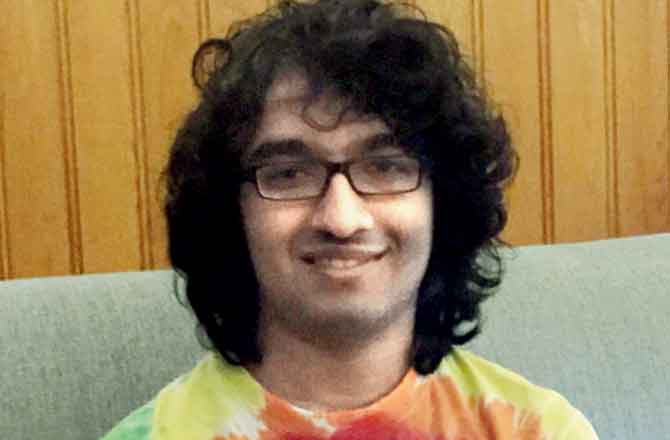A student-led LGBTQi collective at Bombay International School is setting the example for an inclusive atmosphere by talking homophobia and casual sexism in classes and corridors

The core members of Garv comprise Std 11 and Std 12 students who operate as a support group. Pics/Ashish Raje
In September, when the Supreme Court struck down a 19th century law criminalising homosexuality in India, there was widespread jubilation in the classrooms of Bombay International School (BIS). While the Std 11 and 12 students at the Babulnath outpost recall shedding a few tears of joy, the Std VI students proudly claim that they, in fact, had a role to play in the delivery of the landmark judgment. For, it was in March 2017 that 35 students from their class [then in Std V at the Churchgate outpost] had appealed to the government to do away with the draconian law. The document, containing signatures from parents, teachers and students, was sent to Humsafar Trust. They had also gone a step further and sent an email to principal Dr Cyrus Vakil to hire a transgender teacher.
ADVERTISEMENT
A year later, the momentum is far from running thin. If anything, it is only gaining steam. And, a large part of this "silent revolution" can be attributed to a 15-member student collective titled Garv. A brainchild of former student Kabir Karamchandani, the support group was formed in February last year to address homophobia on school premises. "What prompted me was the casual and rampant use of homophobic language in everyday conversation. This can be especially challenging for young people as they're developing their identity. It was an issue that needed to be addressed," he tells us in an email interview. He then approached the teachers who were, by and large, supportive of the initiative. While some teachers did show resistance to have their students spoken to about these issues, Karamchandani says he was lucky enough to have the approval of the principal. While the 20-year-old may be miles away pursuing his higher education in Oberlin, Ohio, his legacy is being carried forward by a dedicated team of "woke" boys and girls. "Dad, this is gender stereotyping"

Parent Alpana Dange, Aahanna Mahtani, Zayee Ajmera, and Vedika Sabnavis with mother Amrita. According to the kids, earlier there were sniggers among peers when two boys or two girls would be “too pally”. Those taunts have now stopped
We meet 12-year-old students Aahanna Mahtani, Zayee Ajmera, and Vedika Sabnavis on a warm December afternoon, and the discussions — much to our amazement — oscillate between gender discrimination and equal opportunities to bits about same-sex love thrown in. Turns out, we aren't the only one to have been pleasantly surprised by the dialogue. "This has been part of our dinner time discussions, too," laughs Alpana Dange, 47, parent and a consultant researcher with Humsafar Trust. She recalls an incident when her son, Ajinkyaa, 11, was gushing about fellow classmate Vedika's wizardry in spellings. "So, my husband casually said, 'Girls are usually good at spellings.'
To this, Ajinkya replied, 'Dad, this is gender stereotyping!" she laughs. Vedika's mother, Amrita, agrees that they have had to watch their Ps and Qs in the presence of their children.
The "awakening", so to speak, happened organically among both senior and junior students, says Priya Aga, diploma programme coordinator and psychology teacher. "Among seniors, it was the formation of Garv, and for the juniors, it was a year-end exhibition, where they chose to look at 'discrimination' through the lens of women and queer communities," she adds. Surprisingly, the idea of exploring LGBTQi rights came from the students themselves.

Priya Aga
No more sexist slurs
Seeing the serendipitous sequence of events, the teachers decided it was time to introduce Garv to younger students as well. "We got 15 seniors to discuss homophobia and gender stereotyping with the kids, and the discussion was rather interesting," she says. Radha Prasad and Ketaki Mavinkurve, Std 5 teachers, say it was rather impressive the manner in which the senior students went about the process. "They gave instances to drive home the message. For instance, if you're standing in the queue at an airport abroad and a foreigner casually says, 'Oh, these Indians are so slow'. Now without directly hinting at you, he's taking a dig at your frat," she says. It's the same with homophobia, says student and Garv member Shambhavi Geetha. "For many, it's cool and funny to make remarks like 'Hey, this is so gay' or 'What a fa***t', without realising that these homophobic tropes can alienate and inflict pain on those from the LGBTQi community," she says.
While most interactions have turned out swell, Madhullikka Singh, member of Garv, says before each they would invariably find themselves on the edge. "At the time, Section 377 was still a criminal offence, so we had to still put across the fact while still sounding politically correct," she says. The team even approached the school counsellor to vet the content they had prepared. The topic, they soon learnt, was easier to broach with younger kids, who were open to learning. Garv member Nandish Vora, 17, says there were times when they had to face sniggers from their peers. "They had questions like, 'If the person who is gay doesn't have a problem with the joke, why should anybody else?' So, it was tricky to correct their observation," he says. While the team operates as a support group, they are yet to tackle cases of outright homophobic bullying. But when they do identify cases of covert homophobia, they have learnt to tread with caution. "We out them but not in aggressive manner. It's through dialogue," he says. The trouble, adds another student Neil Nooreyezdan, is the extent of internalisation, where you end up passing remarks without even realising you are being homophobic. "All of us have been guilty of it at some point. So, it is important to be careful of our language," he says.

Kabir Karamchandani
Funnily, the awareness around gender rights has led to boys demanding "their own rights", one being to grow their hair long. "When they heard this, the leadership of the primary section said, alright but on the condition that it's neat and tidy," says Sabnavis, who is part of the parent committee and actively involved in the school functioning. No wonder then, we see boys with manes held in place with hairbands. Dange, who works with Humsafar Trust, says the nonprofit is conducting a large scale survey on bullying in schools, where the Garv initiative might be included as a case study. "I believe Garv is a great example of how students can be given agency. Once the report is ready, we will present it to the state government."
Catch up on all the latest Mumbai news, crime news, current affairs, and also a complete guide on Mumbai from food to things to do and events across the city here. Also download the new mid-day Android and iOS apps to get latest updates
 Subscribe today by clicking the link and stay updated with the latest news!" Click here!
Subscribe today by clicking the link and stay updated with the latest news!" Click here!






